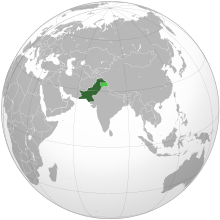
Back LGBT-regte in Pakistan Afrikaans معاملة المثليين في باكستان Arabic পাকিস্তানে সমকামীদের অধিকার Bengali/Bangla LGBT práva v Pákistánu Czech Hawliau LHDT ym Mhacistan Welsh Homosexualität in Pakistan German Diversidad sexual en Pakistán Spanish Droits LGBT au Pakistan French זכויות להט"ב בפקיסטן HE पाकिस्तान में एलजीबीटी अधिकार Hindi
LGBT rights in Pakistan | |
|---|---|
 Area controlled by Pakistan shown in dark green;
claimed but uncontrolled regions shown in light green. | |
| Status | Illegal since 1862; criminalised under Section 377[1] |
| Penalty |
|
| Gender identity | Third gender recognised; transgender people allowed to change legal gender |
| Military | No |
| Discrimination protections | Gender identity only, not sexuality |
| Family rights | |
| Recognition of relationships | No recognition of same-sex unions |
| Adoption | No |
Lesbian, gay, bisexual, and transgender (LGBT) people in Pakistan face legal and social difficulties and persecution compared to non-LGBT persons. Pakistani law prescribes criminal penalties for same-sex sexual acts.
The Pakistani Penal Code of 1860, originally developed under the British Raj, criminalises sodomy with possible penalties of prison sentences from two years to a life sentence and fines. Despite its illegality, homosexual acts are only occasionally prosecuted by authorities, but it's sometimes used to threaten and harass homosexuals under threat of prosecution.[3][4] Other morality and public order provisions in the Penal Code are used to target LGBT Pakistanis as well.[1] Another greater problem can be vigilate policing and killings by Islamist and terrorist groups.[5] Police may also act illegally and arrest LGBTQ individuals despite the law stating otherwise.[6]
Discrimination and disapproval of the LGBT community and the associated social stigma, which can lead to harassment and violence, make it difficult for LGBT people to have steady relationships.[7] Nevertheless, the LGBT community is still able to socialise, organise, date, and even—in rare cases—live together as couples, if done mostly in secret.[8] Neither same-sex marriages nor civil unions are permitted under current law and are scarcely ever brought up in the political discourse, with people who have engaged in same-sex marriages being arrested and prosecuted.
Pakistan does not have civil rights laws to prohibit discrimination or harassment on the basis of sexual orientation. In a historic 2009 ruling, the Supreme Court of Pakistan ruled in favour of civil rights for transgender citizens, and further court rulings upheld and increased these rights. The Parliament of Pakistan passed the Transgender Persons (Protection of Rights) Act, 2018, which established broad protections for transgender people.
A petition to challenge the Act was filed in 2020 with the Federal Shariat Court of Pakistan. The challenge was based on an argument that rather than protections for transgender rights, the act could in effect decriminalise homosexuality because it distinguished between gender and sex. On 19 May, 2023, the Shariat Court ruled in favour of the petitioners, concluding that Islamic law is based on biological sex, and declaring that sections 2(f), 3 and 7 of the Act, concerning self-perceived gender, do not conform with Islamic principles. Local transgender groups have said they plan to lodge appeals with the Shariat Appellate Bench of the Supreme Court. Until a final ruling is rendered, the provisions of the Act will remain in effect. In addition, the Court's judgement confirmed the legitimacy of a third gender for intersex persons under Islamic law.[9][10][11][12]
- ^ a b
- Bureau of Democracy, Human Rights and Labor. "Pakistan 2016 Human Rights Report" (PDF). www.state.gov. United States Department of State. p. 50. Archived from the original (PDF) on 7 March 2017. Retrieved 28 March 2017.
Consensual same-sex sexual conduct is a criminal offense; however, the government rarely prosecuted cases
- Bureau of Democracy, Human Rights, and Labor (2022). "Section 6. Discrimination and Societal Abuses". 2022 Country Reports on Human Rights Practices: Pakistan (Report). United States Department of State.
- Bureau of Democracy, Human Rights and Labor. "Pakistan 2016 Human Rights Report" (PDF). www.state.gov. United States Department of State. p. 50. Archived from the original (PDF) on 7 March 2017. Retrieved 28 March 2017.
- ^ Cite error: The named reference
ILGA 2020was invoked but never defined (see the help page). - ^ "Country policy and information note: Sexual orientation and gender identity and expression, Pakistan, April 2022 (accessible)". GOV.UK. Retrieved 15 April 2024.
- ^ "Country profile: Pakistan". Human Dignity Trust. Archived from the original on 1 January 2023. Retrieved 13 February 2023.
- ^ Cite error: The named reference
:2was invoked but never defined (see the help page). - ^ "Country policy and information note: Sexual orientation and gender identity and expression, Pakistan, April 2022 (accessible)". GOV.UK. Retrieved 19 April 2024.
- ^ Mobeen Azhar (27 August 2013). "Gay Pakis: Where sex is available and relationships are difficult". BBC News. Retrieved 11 February 2014.
In practice, though, these laws are rarely enforced, and the issue tends to be dealt with inside the family.
- ^ "Gays in Pakistan Move Cautiously to Gain Acceptance". The New York Times. 3 November 2012.
- ^ "Pakistan: Federal Shariat Court Revokes Gender Change From Trans Act 2018". Outlook India. 20 May 2023.
- ^ Abbasi, Zubair (31 May 2023). "Balancing Gender Rights: Pakistan's Federal Shariat Court's Verdict on Self-Perceived Gender Identity". Oxford Human Rights Hub | OHRH. The Faculty of Law, University of Oxford.
- ^ "Activists to appeal Pakistani Shariat Court's scrapping of sections of 2018 transgender law". Peoples Dispatch. 25 May 2023.
- ^ "Pakistan: Revocation of rights of transgender and gender-diverse people must be stopped". Amnesty International. 19 May 2023.
© MMXXIII Rich X Search. We shall prevail. All rights reserved. Rich X Search